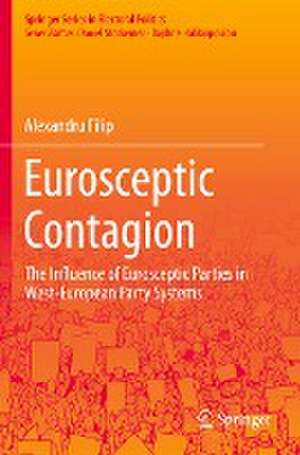Eurosceptic Contagion: The Influence of Eurosceptic Parties in West-European Party Systems: Springer Series in Electoral Politics
Autor Alexandru Filipen Limba Engleză Paperback – 20 mar 2022
In light of the growing support for populist political actors, this book examines political party behavior and political positions towards the integration process in the European Union. It explores the correlation between eurosceptic success and mainstream party behavior.
Presenting both an indepth empirical investigation of electoral campaigns and the politics of party leaders, as well as applying various theoretical models, the author analyses different eurosceptical trends and circumstances and dynamics of eurosceptic contagion. In particular, he addresses the following questions: Do Europe's mainstream parties maintain their standard discourse and policy positions unaltered, or are they forced to qualify their typical pro-integration stances when eurosceptic challengers are successful at the ballot box? Are some parties or party systems more susceptible to eurosceptic “contagion” than others? These are just some of the timely questions thatare examined by the author.
The book argues that political parties at the ideological center of their party systems use the electoral success of eurosceptic parties as indications of changes in the public’s political preferences. In order to avoid losing voters to these parties, moderate parties will qualify their positions on the issue of EU integration. The author explores these dynamics and discusses their implications for the future of European integration.
| Toate formatele și edițiile | Preț | Express |
|---|---|---|
| Paperback (1) | 779.32 lei 6-8 săpt. | |
| Springer International Publishing – 20 mar 2022 | 779.32 lei 6-8 săpt. | |
| Hardback (1) | 784.30 lei 6-8 săpt. | |
| Springer International Publishing – 20 mar 2021 | 784.30 lei 6-8 săpt. |
Preț: 779.32 lei
Preț vechi: 950.39 lei
-18% Nou
Puncte Express: 1169
Preț estimativ în valută:
149.14€ • 155.51$ • 123.95£
149.14€ • 155.51$ • 123.95£
Carte tipărită la comandă
Livrare economică 20 martie-03 aprilie
Preluare comenzi: 021 569.72.76
Specificații
ISBN-13: 9783030690380
ISBN-10: 3030690385
Ilustrații: VII, 227 p. 83 illus.
Dimensiuni: 155 x 235 mm
Greutate: 0.37 kg
Ediția:1st ed. 2021
Editura: Springer International Publishing
Colecția Springer
Seria Springer Series in Electoral Politics
Locul publicării:Cham, Switzerland
ISBN-10: 3030690385
Ilustrații: VII, 227 p. 83 illus.
Dimensiuni: 155 x 235 mm
Greutate: 0.37 kg
Ediția:1st ed. 2021
Editura: Springer International Publishing
Colecția Springer
Seria Springer Series in Electoral Politics
Locul publicării:Cham, Switzerland
Cuprins
Introduction.- Theoretical and Analytical Framework.- The evolution and Trends of Eurosceptic Success.- Do Eurosceptic Parties influence their Party Systems?.- The Circumstances and Dynamics of Eurosceptic Contagion.- Explaining Contagion - Tactical, Ideological, or Geographical Impulses?.- Eurosceptic Contagion and European Elections.- Conclusion and Discussion.
Notă biografică
Alexandru Filip currently teaches at the Department of Political Science of the Johannes Gutenberg Universitz, Mainz (Germany). Prior, he was a visiting fellow at the Hertie School, Berlin (Germany). He obtained his doctorate at the Bremen International Graduate School of Social Sciences (BIGSSS) in 2017. He is a scholar of European integration and his main interests lie in the fields of European Union politics, populism and electoral competition.
Textul de pe ultima copertă
In light of the growing support for populist political actors, this book examines political party behavior and political positions towards the integration process in the European Union. It explores the correlation between eurosceptic success and mainstream party behavior.
Presenting both an indepth empirical investigation of electoral campaigns and the politics of party leaders, as well as applying various theoretical models, the author analyses different eurosceptical trends and circumstances and dynamics of eurosceptic contagion. In particular, he addresses the following questions: Do Europe's mainstream parties maintain their standard discourse and policy positions unaltered, or are they forced to qualify their typical pro-integration stances when eurosceptic challengers are successful at the ballot box? Are some parties or party systems more susceptible to eurosceptic “contagion” than others? These are just some of the timely questions that are examined by the author.
The book argues that political parties at the ideological center of their party systems use the electoral success of eurosceptic parties as indications of changes in the public’s political preferences. In order to avoid losing voters to these parties, moderate parties will qualify their positions on the issue of EU integration. The author explores these dynamics and discusses their implications for the future of European integration.
Caracteristici
Explores the correlation between eurosceptic success and mainstream party behavior. Presents the changing circumstances of eurosceptic contagion. Examines implications for the future of European integration.






